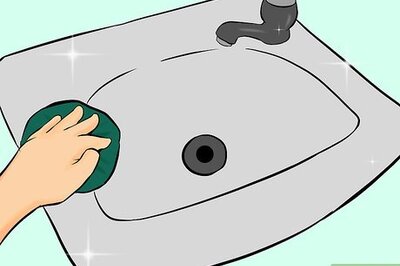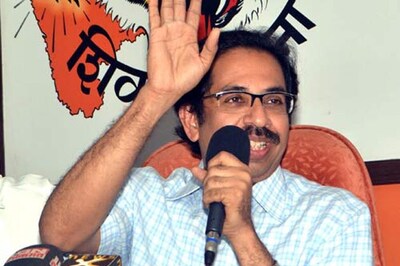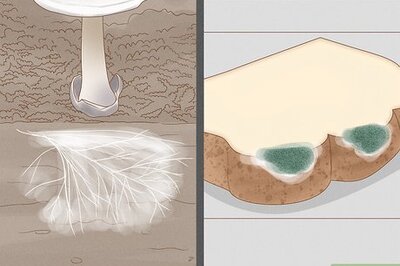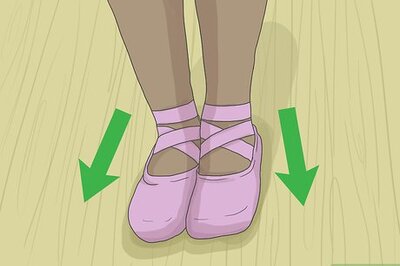
views
“Music is a vast ocean and no one can claim to know it all. The more you know, the more you realise how little you know. It is an eternal quest” — Dr L Subramaniam As trembling rhythms synchronise with emotions and memories; etudes and arpeggios breathe clarity of distinction into musical cadences. While rhythmic swirls of notes and tones blend together in strokes of melody; the dynamic force of vibrations and sounds capture serenity. Music has always had a profound effect on civilisations for ages. And, the playful hues of sounds and vibrations today have opened up possibilities of creating experiences for each and every individual in the world.Resonating with varied emotions, gestures and contours of human expression; music indeed has formed an integral part of life and evolution over the years.When Dr L Subramaniam channels his meditative spirit and vigour through the violin; the synchronous merge of tones, rhythm and strings of melody give rise to passion and romance in sheer poetry. So, it comes as no surprise that the mystic quality and harmonic structure of his style has earned him the title ‘Paganini of Indian classical music’. Composure of an Indian musician seamlessly combined with the charisma of a rock star; this ‘violin chakravarthy’ boasts of a diverse repertoire and embellished sounds. Transcending all barriers with contrasting genres; Dr L Subramaniam’s flawless rendition of raagas intensified emotions and sought oneness amidst purity at Virasat 2011, a Spicmacay concert held at NIMHANS recently. City Express embarks upon a journey into the realm of music with Dr L Subramaniam and troupe.When did you develop the passion for music with the violin? Well, my father Professor V Lakshminarayana started noticing the talent in me when I was very young. I was initially trained in Carnatic vocal and then gradually moved to violin. My father being a violinist and mother a singer and Veena player; music was and always will be an important part of my life. I fell ill as a child and my parents were extremely concerned I would lose my voice. Hence, I started training in mridangam and tabla. But, I always shared a fascination for the violin.Your release, Spring — Rhapsody was an homage to Bach and Baroque music. Tell us about your journey with this piece.Well, I really wished to learn Western classical music when I finished my medical degree. I had the opportunity to appreciate and listen to some of the greatest musicians of Western classical music. One of the pieces that really moved me was a Johann Sebastian Bach piece played by the violinist Joshua. I soon moved to the US and completed my masters in music in nine months.Subsequently, I was informed by the dean that he couldn’t grant me the degree ‘in nine months’ and proposed that I teach for a while. So I decided to stay back. And, I started writing music compositions.Eventually, the New England Conservatory Orchestra commissioned me to compose and conduct a piece. And that’s how Spring — Rhapsody was born. It is written for a flute, an oboe, a clarinet and strings and is a composition in three movements.Fantasy on Vedic chants was a beautiful merge of melody with passion. Can you tell us more about this composition? Well, Fantasy on Vedic chants was written in memory of my mother. She passed away in 1984. And, at that time I was working on Peter Brook’s production of Mahabharatha. Her death affected me deeply and I was in no position to compose any piece. Hence, I informed Brooks that I won’t be able to work for a while. It was quite depressing. Later, when Zubin Mehta was visiting LA; he suggested composing a piece for the New York Philharmonic.It was my father’s insistence to not give up that drove me towards writing this piece. He said What better way to honour your mother than with music? This is an East-West composition that is based on the three toned chants of the Vedic hymns. And, it makes use of the mridangam, ghatam and the tambura. It was my way of transitioning from depression to acceptance or reality.What are your thoughts on East-West orchestral fusion music which is becoming increasingly popular these days? Well, I initiated the concept of global fusion music in the 70s. I did an early album titled Fantasy without limits. Also, collaborating with artistes from all over the world and composing pieces for another album Global Music in 1999 was inspiring to say the least.Besides, the Lakshminarayana Global Music Festival has provided a platform to explore different music genres in a collective manner. Fusion indeed requires a different approach and sound understanding of different concepts in music.What is it about music that intrigues you the most? The power of music is astral.When I start playing the violin; I am immediately transported to a different state of mind with the colourful vibration of sounds. And, the inner satisfaction assosiated with music is immense.Transferring that energy to another entity is incredible; and exploring that realm is intriguing.In a way spirituality is extremely sound in Carnatic music. Most of the composers are interconnected with spirituality.Tell us about your album Astral Symphony Well, Astral Symphony was a very interesting concept.My daughter Bindu too was involved with this composition.At the age of 11, she was the youngest Western soloist to perform with the orchestra.The concept of this symphony revolved around replacing each of the soloists with different musical instruments and vice versa. It was a culmination of global fusion in its truest sense. We had some amazing instruments from Iran and Africa too.Do you think Carnatic music as a genre paves way for more soul stirring melodies than any other genre? Undoubtedly, Carnatic music is extremely soulful as a genre especially with instrumental pieces. When you listen to a composition in one particular language, it becomes difficult for you to comprehend the expression of the composer or the performance in general.We all belong to the same species; and music and culture are nothing but expressions of our emotions. This can be observed at all musical gatherings.Before any concert, you may observe hostility or indifference amongst people.However, after the concert as the energy of the music diffuses into each and every person; you make an instant connection with one another.Any future projects we need to look forward to? Well, I have produced an album titled Surrender for my daughter. Apart from that I will release a DVD set which marks my father Professor Lakshminarayana’s centenary birth anniversary.




















Comments
0 comment